#Land Survey in India
Text
#Tomography Survey in India#Topographical Survey Company in India#Topographic Survey in India#Topographical Survey in India#DGPS Survey company in India#Land Survey Company in India#Detailed Project Report Preparation in India#Topographic Survey#Topographical Survey#Land Survey in India#DGPS Survey in India#DGPS Survey#DGPS#Land Survey#epitome
0 notes
Text
#Tomography Survey in India#Topographical Survey Company in India#Topographic Survey in India#Topographical Survey in India#DGPS Survey company in India#Land Survey Company in India#Detailed Project Report Preparation in India#Topographic Survey#Topographical Survey#Land Survey in India#DGPS Survey in India#DGPS Survey#DGPS#Land Survey#epitome
0 notes
Quote
Historically, Dalits were prohibited from holding productive and knowledge resources, especially land, because of their caste status. Land reforms failed except in a few states: the tenancy reforms primarily benefited the middle-castes but the distribution of ceiling-surplus land to the landless failed miserably.The National Sample Survey Office reveals that more than 58% of all rural Dalit households in India were landless in 2013. The list of top three states in this regard — Haryana (92%), Punjab (87%) and Bihar (86%) — suggests that Dalit landlessness remains unaffected by agricultural development (or the lack of it).
Awanish Kumar, ‘Ambedkar and his idea of the caste of land’, Indian Express
#Indian Express#Awanish Kumar#Dalits#casteism#Land reforms#tenancy reforms#National Sample Survey Office#rural Dalit households#India#Haryana#Punjab#Bihar#Dalit landlessness#agricultural development#landholding
5 notes
·
View notes
Text
Land Survey of Bihar is the Need of the Hour
The first land survey of Bihar was conducted in 1950 after the abolition of the Zamindari system, when the Supreme Court of India finally approved it along with the Bihar Land Reform Act passed in the Bihar Assembly. Since then, it took 74 years to do the second time in 38 districts of Bihar, which consisted of around 45,000 villages. Despite Bihar's status as India's agricultural state, home to 13 crore people, the Bihar government has shown no concern for this issue.
Now, the question arises in such a dismal consideration of the state government: why is the land survey of Bihar being conducted? What is the purpose of the state government for conducting land surveys? There seems to be nothing clear on this aspect rather than only one strong reason that the world has become digital and the land of Bihar is sitting idle in the name of ancestors, which has no relevance to the young generation....know more
#Land survey#Land survey of Bihar#Agriculture Land survey in Bihar India#Land survey of Bihar halted#Corruption in Land survey of Bihar#Problems faces by the people of Bihar
0 notes
Text
स्मारकों के स्वामित्व को लेकर भिड़े एएसआई और वक्फ बोर्ड, एएसआई ने जेपीसी को सौंपी ऐसे 120 स्मारकों की सूची
स्मारकों के स्वामित्व को लेकर भिड़े एएसआई और वक्फ बोर्ड, एएसआई ने जेपीसी को सौंपी ऐसे 120 स्मारकों की सूची
#News #DelhiNews #DelhiUpdates #DelhiPolitics #DelhiEvents #DelhiLifestyle #DelhiBuzz #DelhiCulture #DelhiCommunity #DelhiActivism #DelhiEducation
Delhi News: एएसआई और वक्फ बोर्ड के बीच स्मारकों के स्वामित्व को लेकर विवाद छिड़ा है। वक्फ (संशोधन) विधेयक की जांच कर रही संसदीय समिति को भारतीय पुरातत्व सर्वेक्षण (एएसआई) ने शुक्रवार को 120 से अधिक स्मारकों की सूची पेश की।
एएसआई ने कहा कि स्मारक उनके संरक्षण में हैं, लेकिन विभिन्न राज्य वक्फ बोर्ड स्मारकों पर अपना दावा करते हैं। विपक्षी सदस्यों ने एएसआई की दलील की आलोचना की कि मुस्लिम निकाय किसी…
#archaelogical survey of india#archaeogical survey of india#archaeological survey of india#archaeological survey of india (asi)#archaeological survey of india and the historical imagination#archaeological survey of india delhi#archaeological survey of india gives clarity on qutub minar#archaeological survey of india inspection in weaving factory#archaeologists survey of india#archeological survey of india#ASI#asi vs waqf board on tajmahal#delhi waqf board#India#JPC#land grab waqf board#list of 120 monuments#monuments#ownership#pm modi archaeological survey of india#shia waqf board#sunni waqf board#up waqf board survey#wakf board#waqf board#waqf board bill#waqf board chairman#waqf board controversy#waqf board land grab#waqf board latest controversy
0 notes
Text
GIS Land Survey Services in India
Geographic information system (GIS) survey firm in India provide a centralized place for data collection and processing, which is essential for modern planning, surveying, and building services.
Professional surveyors can use GIS to improve survey accuracy while lowering costs. When you use Spade Survey for GIS survey services, you can be confident that we will collect reliable data and ensure the success of your project.
Spade Survey provides GIS-based surveying services to support highly specialised infrastructure or development projects, with the goal of delivering the best findings possible.
#GIS Mapping Services#GIS Survey Services in India#GIS Land Survey Services in India#GIS Mapping Firm in India#GIS survey services in india
0 notes
Text
#Dump Yard Drones Inspection#Yard Waste Dump in India#lidar drones#drone land surveying#drones in solar industry#land surveying drones
0 notes
Text
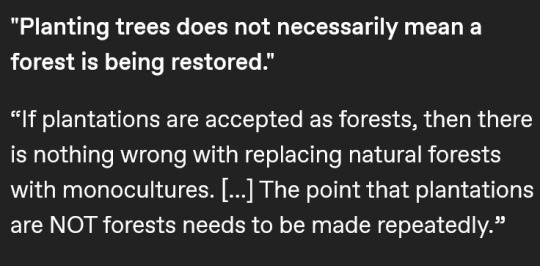
Despite its green image, Ireland has surprisingly little forest. [...] [M]ore than 80% of the island of Ireland was [once] covered in trees. [...] [O]f that 11% of the Republic of Ireland that is [now] forested, the vast majority (9% of the country) is planted with [non-native] spruces like the Sitka spruce [in commercial plantations], a fast growing conifer originally from Alaska which can be harvested after just 15 years. Just 2% of Ireland is covered with native broadleaf trees.
Text by: Martha O’Hagan Luff. “Ireland has lost almost all of its native forests - here’s how to bring them back.” The Conversation. 24 February 2023. [Emphasis added.]
---
[I]ndustrial [...] oil palm plantations [...] have proliferated in tropical regions in many parts of the world, often built at the expense of mangrove and humid forest lands, with the aim to transform them from 'worthless swamp' to agro-industrial complexes [...]. Another clear case [...] comes from the southernmost area in the Colombian Pacific [...]. Here, since the early 1980s, the forest has been destroyed and communities displaced to give way to oil palm plantations. Inexistent in the 1970s, by the mid-1990s they had expanded to over 30,000 hectares. The monotony of the plantation - row after row of palm as far as you can see, a green desert of sorts - replaced the diverse, heterogenous and entangled world of forest and communities.
Text by: Arturo Escobar. "Thinking-Feeling with the Earth: Territorial Struggles and the Ontological Dimension of the Epistemologies of the South." Revista de Antropologia Iberoamericana Volume 11 Issue 1. 2016. [Emphasis added.]
---
But efforts to increase global tree cover to limit climate change have skewed towards erecting plantations of fast-growing trees [...] [because] planting trees can demonstrate results a lot quicker than natural forest restoration. [...] [But] ill-advised tree planting can unleash invasive species [...]. [In India] [t]o maximize how much timber these forests yielded, British foresters planted pines from Europe and North America in extensive plantations in the Himalayan region [...] and introduced acacia trees from Australia [...]. One of these species, wattle (Acacia mearnsii) [...] was planted in [...] the Western Ghats. This area is what scientists all a biodiversity hotspot – a globally rare ecosystem replete with species. Wattle has since become invasive and taken over much of the region’s mountainous grasslands. Similarly, pine has spread over much of the Himalayas and displaced native oak trees while teak has replaced sal, a native hardwood, in central India. Both oak and sal are valued for [...] fertiliser, medicine and oil. Their loss [...] impoverished many [local and Indigenous people]. [...]
India’s national forest policy [...] aims for trees on 33% of the country’s area. Schemes under this policy include plantations consisting of a single species such as eucalyptus or bamboo which grow fast and can increase tree cover quickly, demonstrating success according to this dubious measure. Sometimes these trees are planted in grasslands and other ecosystems where tree cover is naturally low. [...] The success of forest restoration efforts cannot be measured by tree cover alone. The Indian government’s definition of “forest” still encompasses plantations of a single tree species, orchards and even bamboo, which actually belongs to the grass family. This means that biennial forest surveys cannot quantify how much natural forest has been restored, or convey the consequences of displacing native trees with competitive plantation species or identify if these exotic trees have invaded natural grasslands which have then been falsely recorded as restored forests. [...] Planting trees does not necessarily mean a forest is being restored. And reviving ecosystems in which trees are scarce is important too.
Text by: Dhanapal Govindarajulu. "India was a tree planting laboratory for 200 years - here are the results." The Conversation. 10 August 2023. [Emphasis added.]
---
Nations and companies are competing to appropriate the last piece of available “untapped” forest that can provide the most amount of “environmental services.” [...] When British Empire forestry was first established as a disciplinary practice in India, [...] it proscribed private interests and initiated a new system of forest management based on a logic of utilitarian [extraction] [...]. Rather than the actual survival of plants or animals, the goal of this forestry was focused on preventing the exhaustion of resource extraction. [...]
Text by: Daniel Fernandez and Alon Schwabe. "The Offsetted." e-flux Architecture (Positions). November 2013. [Emphasis added.]
---
At first glance, the statistics tell a hopeful story: Chile’s forests are expanding. […] On the ground, however, a different scene plays out: monocultures have replaced diverse natural forests [...]. At the crux of these [...] narratives is the definition of a single word: “forest.” [...] Pinochet’s wave of [...] [laws] included Forest Ordinance 701, passed in 1974, which subsidized the expansion of tree plantations [...] and gave the National Forestry Corporation control of Mapuche lands. This law set in motion an enormous expansion in fiber-farms, which are vast expanses of monoculture plantations Pinus radiata and Eucalyptus species grown for paper manufacturing and timber. [T]hese new plantations replaced native forests […]. According to a recent study in Landscape and Urban Planning, timber plantations expanded by a factor of ten from 1975 to 2007, and now occupy 43 percent of the South-central Chilean landscape. [...] While the confusion surrounding the definition of “forest” may appear to be an issue of semantics, Dr. Francis Putz [...] warns otherwise in a recent review published in Biotropica. […] Monoculture plantations are optimized for a single product, whereas native forests offer [...] water regulation, hosting biodiversity, and building soil fertility. [...][A]ccording to Putz, the distinction between plantations and native forests needs to be made clear. “[...] [A]nd the point that plantations are NOT forests needs to be made repeatedly [...]."
Text by: Julian Moll-Rocek. “When forests aren’t really forests: the high cost of Chile’s tree plantations.” Mongabay. 18 August 2014. [Emphasis added.]
#abolition#ecology#imperial#colonial#landscape#haunted#indigenous#multispecies#interspecies#temporality#carceral geography#plantations#ecologies#tidalectics#intimacies of four continents#archipelagic thinking#caribbean
2K notes
·
View notes
Text
Excerpted with permission from BREAKING WORLDS: Religion, Law and Citizenship in Majoritarian India; The Story of Assam, a report by the Political Conflict, Gender and People’s Rights Initiative at the Center for Race and Gender at UC Berkeley.
The publication of the draft NRC in Assam in 2018 revealed the exclusion of more than four million persons from the survey rolls. Reportedly, some people were excluded due to spelling errors in their names or inconsistent names in documents. After the draft list was made public, excluded individuals were permitted to submit further documentation proving their citizenship. While a majority were not of Hindu descent, reportedly between one and 1.5 million were Hindus. The exclusion of a large number of Hindus from the 2018 NRC list is presumed to be the foremost reason that changes were made to the citizenship law, and that the Citizenship (Amendment) Act of 2019 was enacted, whereby, in effect, only Muslims would be excluded from citizenship.
The (ostensibly “final”) update to the Assam NRC was undertaken on August 31, 2019. Approximately 1.9 million persons (numbering 1,906,657) were excluded from the 2019 published list, and may potentially lose their citizenship, and face expulsion, exile, and statelessness.
[...]
The Foreigners Tribunal of Assam remains the state mechanism for appeal for persons excluded from the NRC. Individuals may petition the Foreigners Tribunals with requisite documentation validating their citizenship. An appellant is deemed to be either “foreigner” or “citizen” as per the ruling of the tribunal. The process is hard, complex, and arbitrarily and routinely discriminatory. An analysis of 787 Guwahati High Court orders and judgments published by The Wire found that cases before the tribunals took about 3.3 years on average
[...]
September 2019, a Muslim family with land documents dating back to 1927 found that all members of their family were not on the NRC due to: “an objection filed [apparently anonymously] by someone against their inclusion in the final draft.” It is unclear who may file bad-faith objections or how they may be held accountable. Reportedly, approximately 250,000 such objections have been made, mostly anonymously.
[...]
Once declared a “foreigner,” an individual may be held in detention. Immigration detention centers are often locally referred to as “concentration camps.” Detention serves to criminalize and confine those deemed “illegal foreigners.” Without established limits or protocols for ethical resolution of the matter, detentions can be prolonged or indefinite unless deportation ensues. Currently, India operates thirteen detention centers, and others are being constructed to assumedly hold “undocumented” individuals.
77 notes
·
View notes
Text
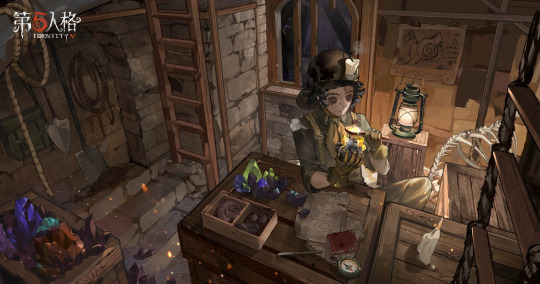
Analysis of the Prospector, Norton Campbell
This is a repost of my Norton Analysis.
Let’s start with where I think Norton was born.
Looking at his last name, Campbell is a surname that originated from the Scottish Gaelic word “Cam”, which meant “crooked”, and “Beul”, which meant “mouth”. It was used by Scottish people during the Victorian period, which is around the right time that Identity V takes place in. If Norton were from Scotland, that could fit with how the name “Norton” means “North Settlement” (considering Scotland is north of England, which is where Oletus Manor is).
Further adding to this idea, Scotland is a coal-rich area, with Lanarkshire having a heavy concentration of collieries (coal mines) back in those days. Ayrshire, Fifeshire, and Stirlingshire are next in order of the number of collieries. Due to Lanarkshire being Scotland’s most populous county, this could be a good guess as to where Norton’s from.
There is also the theory that Norton is from Mexico, based on his S-Tier Soul Catcher being Day of the Dead themed, his provoke emote, Tune (as Season 18 Essence 2 is designed after a Spanish wedding and Spanish costumes), and potentially his connections to the story “The Transition of Juan Romero” (something I’ll discuss more later).
Norton’s provoke emote is a gesture that means “Come and fight me” (info courtesy of @andrewkreiiss, which I’m going to just copy right here so I don’t mess anything up). First is him pointing at someone, that's just like pointing at the person he is addressing, it's something rude to do. Then the second gesture is Norton touching his cheek, this gesture means "come and punch me here on the cheek", it's just him mocking the other person inviting them to come and fight him, showing that he isn't afraid of them. Then the third one is him like thrusting his upper half with his chin, that's something men do when they wanna pick a fight with someone and they wanna look "intimidating". His whole emote is just him confidently picking a fight with someone and mocking them.
(As for Norton’s dance, it’s apparently actually a Columbian dance called “Mapale”.)
As to “The Transition of Juan Romero”, it’s a story by Lovecraft that involves an explosion at a mine called the “Norton” mine.
In the story, the narrator is a man of English origin, an ex-soldier with a penchant for the occult, wearing a ring he acquired in India. After an unhappy experience in India, he abandons his previous career and becomes a laborer at the Norton Mine. He’s living with a man named Juan Romero, who’s part of a group of Mexicans drawn from the nearby lands (to work in the mine), though likely not Mexican himself as he is apparently light-/fair-skinned.
Romero was born into extreme poverty and is the only surviving child of an epidemic that spread around (where he originally lived). He was found in a cabin with the relatively recent remains of his parents not far away from the hut. There was also an unusual looking crack in the rock near the corpse(s) apparently. After Romero is found, an avalanche buries the hut and cracks in the rock (making any clues on his background disappear). Also, apparently Romero doesn’t remember the names of his family or anything else. He was then picked up by a Mexican cattle thief, given a name, and raised by him.
When Romero sees the ring the narrator wears, he becomes really interested, as it seemingly awoke some memory in Romero’s mind (at this point, Romero becomes really adoring of the narrator, likely because the guy’s ring allowed him to get some clue about his parents).
Human error with dynamite causes a cave near the bottom of the mountain to blow up and cause a cave in. Neither Romero or the narrator were involved in the accident, and there were no casualties, but a deep crack was created. The mine foreman orders a survey, but everyone was too scared, so work stopped for the night because a storm was coming.
On the night of the explosion, Romero is asleep when he hears a drum beating an eerie rhythm. Romero seems to get excited or anticipated something because of it. The 2 head towards the mine, as if drawn against their will due to the rhythm (and the narrator’s ring begins glowing at some point as well). Romero reaches the abyss first, and runs off into the darkness, screaming “Huitzilopochtli” (which relates to the mention of Aztecs earlier with Romero in the story). The narrator peers into the abyss, and sees something (something too horrible for him to tell) before falling unconscious. The narrator wakes up the next morning, back in his bunk, but he also finds Romero’s dead body on the table. Everyone also says neither of the 2 left their cabin that night, and the chasm had vanished as well, along with the narrator’s ring.
So, about the important bits from this. There’s obviously the name of the mine, plus the fact a mine, mine workers, and an explosion caused by misuse of dynamite is involved. There’s how the Mexican and Aztec (Huitzilopochtli is the Aztec sun and war god) bits relate to Norton’s S-tier Soul Catcher, which has a Day of the Dead theme. Regarding the Cthulhu elements, we don’t know what entity was involved, but it’s obvious something was going on. Whatever it was, it may connect to the eye in Golden Cave and the meteorite (both of which I’ll discuss later).
As to my guess regarding when he was born, I assume it was around 1870. First off, we know Norton used dynamite according to his deductions, and dynamite wasn’t invented until 1867. Besides this, I’m in part basing my guess off of when Emma’s game was. We know her game was in 1898 by using when she was born, which we know due to Freddy’s deduction 6 (she was born on December 21st, 1876), and her canon age according to the official artbook, which is 22. Next, based on info from Time of Reunion that implies Norton was apart of the final game, that would mean his game took place at least by 1898 if not later. Since Norton is confirmed to be 28, 1870 is a good guess based on the info I listed, since if Norton was born in 1870, he’d be 28 the year Emma was 22 and had her game in 1898.
If Norton was born in 1870, that would mean he would’ve grown up under the recent Elementary Education Act of 1870 (or if he was born in Scotland, the Education (Scotland) Act 1872 would be the equivalent in this case, which funnily enough helped come about due to someone by the name of George Campbell). This law made education for children between the ages of 5 and 13 mandatory, and ensured each distract had a sufficient number of public schools. It didn’t make education free, but in cases of poverty help was given so they could attend. The education was basic, focusing on teaching children reading, writing, and arithmetic, so some poor children supplemented their education by reading the daily papers and other cheap publications.
The fact Norton is described as “full of curiosity” and “likes learning”, with the list of 13 mines, and how he likes “ore evaluation” (+ how he was able to become a geological prospector with his magnets) shows he did at least get a basic education. The BDuck x IDV quiz describes him this way if you get Norton as your final result, while Norton’s deduction 3 in other versions describes him as “diligent” and “studious”.

Speaking of this, it also describes Norton with “desire to act at MAX” or “highest level of execution. This means he’s the type of person to put all his effort into whatever he does. He never goes halfway with something. This thing also describes Norton with “believes action speaks louder than words”. This fits all his tweets as well as his background (which I discuss later, but it relates to how everyone avoids him, as well as how they mock him from trying to get out of poverty. The only way to prove to them that he’d succeed was with action rather than words), and why he’s so quiet.
I mentioned that poor children did receive help to attend public school. We know he was poor based on Norton’s father, who was a miner. We know this due to Benny (who I’ll get into shortly) stating he was a friend of Norton’s father, and Benny is a miner. Miners were part of the lowest class and social status, and typically lived in poverty.
As we’re talking about Norton’s father, let me talk about his parents a little more.
They’re never brought up except by Benny who calls himself a friend of Norton’s father. As such, the implication is that they died, likely when Norton was relatively young. His parents being dead can be backed up by Norton’s Ronald of Ness skin from Golden Rose Theater and Sparrow from Teahouse Tales. In Golden Rose Theater, Ronald’s father takes the blame for causing Lachesis’ death and dies from a “severe cold illness” shortly after being imprisoned. In Teahouse Tales, Lady 13 is Sparrow’s adopted mother. She’s betrayed and murdered by Flying Guillotine.
An interesting note, in both examples, Norton only has 1 parental figure. We know Norton knew his father to some extent based on Benny’s comment. Therefore, I wonder if that could mean Norton’s mother either died very young (like in childbirth) or she left Norton and his father at some point (like Martha Remington did to Leo and Emma).
Based on Benny having to tell Norton that he was a friend or coworker of his father, this makes me think Norton never worked with his father, otherwise he would’ve already known this. In which case, it’s possible this could imply his parents died before Norton turned 12 years old. I say this due to the Mines Regulation Act of 1860 which prevented children under the age of 12 from working in the mines. Also there’s how when a boy turns 12 and enters a coal pit, he’s attached to his father or some other man until he works long enough to become an actual miner. However, this law wasn’t always well-enforced, and there were provisions that allowed children between the age of 10 and 12 to work in the mines under certain conditions, so it’s still possible.
Considering Norton’s 2nd letter (which I’ll discuss later), he mentions how he’s been working for “20 years”. Since Norton is 28, this could mean he lost his parents and became a miner at 8 years old.
Either way, after losing both his parents, Norton ends up becoming an orphan at a young age and has to work to provide for himself. Due to who his father was and how poor they were, Norton likely became a coal miner, especially as coal was the primary source of energy at this time. As a rule, the sons of miners follow the occupation of their fathers, and begin to work when they reach twelve years of age.
Miners were expected to work at least a daily twelve-hour shift (though hours a miner had to work varied from mine to mine) on weekdays, reduced hours on Saturday and Sunday being the day of rest, with few breaks. They walked miles from their housing to the mines, and further still as they had to go down the mine shafts to where the ore/coal was being mined (mines got really deep in the 2nd half of the 19th century). Underground roadways were usually narrow, uneven, and low as owners didn’t want to increase their costs by making them bigger. All in all, it was incredibly cramped, and such conditions made accidents and injuries a common occurrence.
They also worked in complete darkness except for the candles or lighting they had to buy themselves.
Working in the mines was very dangerous & unhealthy and most miners who survived the physical dangers inherent in the working environment even succumbed to mine-related respiratory diseases such as silicosis in later life. Accidents were common, but compensation after an accident was very low. To make matters worse, mine owners didn’t care about the health and safety of their workers.
Beatings were also common. Sometimes for not being quick enough, sometimes for complaining, or sometimes simply just for making a mistake.
As to a number of hazards and risks miners had to face every time they went into the mines that could cause their death:
falling down a mine shaft on the way down to the coal face
falling out of the ‘bucket’ bringing you up after a shift
being hit by a ball of dug coal falling down a mine shaft as it was lifted up
flooding/drowning in the mine
collapsing roofs, shafts, and equipment/crushed to death
killed by explosions (fire damp)
suffocation by poisonous gas
being run over by a tram carrying dug coal in the mine itself
fires
ropes and chain breakages
trapped after a collapse
Additionally, underground mines were hot and damp. The air was musty and infested with coal which had the potential hazard of being flammable. This gas, also mixed with methane, had serious health effects, including: numbness, violent headaches, partial deafness, risk of choking on the thick dust, and black lung disease.
This would explain why Norton breathes so harshly in game. His lungs have likely been damaged from working so long and hard in the mines.
Regarding some statistics about the percentages of deaths from various methods according to 1 study:
Percentages of deaths caused by explosions from fire damp: 23-57%
Percentages of deaths caused by falls of roofs and sides: 40-77%
Percentages of deaths caused by misc. causes: 35-66%
As to the highest and lowest percentages of deaths for each method in this study:
Deaths by explosions: In 1878, the percentage of deaths was 41.6%. In 1884, it was 6.9%.
Deaths by falls of roof and sides, which was almost always higher than explosions: In 1881, the percentage of deaths was 47%, while in 1878, it was 33%.
Deaths by other causes: In 1878, it was 59%.
Finally, as to statistics regarding how many deaths occurred:
Between 1875-1885: 12.3k deaths, with at least 1k deaths per year.
Number of people employed in 1850, about 200,000 people employed, deaths exceeded 1k a year.
In 1877, when the number of people was employed was double that in 1850 (400,000), the deaths were a little over 1.2k a year
Safety lamps were invented eventually, which helped prevent explosions caused by the presence of methane in the pits. The flames of the lamp also helped notify miners of the invisible presence of flammable gases by burning brighter and with a tinge of blue when these flammable gases were present.
Despite how dangerous and risky it was to work in the mines, the wages were quite low. Mine owners even continued to refuse a wage increase for miners over the years.
Miners were paid by the amount and quality of the coal they produced, rather than simply by the hour. Of course this gave owners and managers plenty of ways to reduce how much they paid miners, such as claiming coal was of poor quality or rigging their scales, or by fining miners if there was too much “slack” (the smaller pieces).
The average wage of coal miners in the 1880s was somewhere between 3s (s = shillings) and 5s per day, with around 4s being closer to the normal, and 5 only if you were lucky. 4 shillings was about $1.20. Generally though wages varied greatly in different districts.
Rent was either free or around 2s a week in a colliery village, which were settlements built by the owners of coal mines to house their workers. These homes were cramped, very basic, lacked adequate sanitation, and had poor drainage. Furniture was sparse and the low wages made it difficult to afford more than the basics. During bad weather, these homes suffered especially in damp weather due to poor construction, and puddles sometimes formed on the floor. Speaking of water, sometimes it was necessary to walk long distances to find water for cooking and cleaning, as not every colliery provided water for its homes. Collieries also provided a company store, which was normally a miners’ only option for buying groceries, mining tools, and other goods. As the only store in town, companies didn’t have to worry about competition, thus they typically charged exorbitant prices compared to what people in cities paid for the same items. In some cases, miners were compelled to use the company store by mine officials. Sometimes, miners were paid instead with something that could only be used at the company store.
As to potential costs of some other expenses:
Food: about 11s a week
Soap, starch, blue, and soda: 6p a week
1 pound of candles for coal pit: about 1s
1 pound of blasting powder: 1s
Fuel (coal and wood): 2s a week
Paraffin oil (for lamp and stove) and other sundries: 1 and a half shillings a week
Clothes, gloves, and shoes: no more than maybe 2s a week
Insurance (medical attendance, weekly doctor fee): between half a shilling and 1s a week
Sharpening work tools: half a shilling
Shovels: 2 shillings
Then there’s how even if a miner wanted to work harder and longer to earn more (up to a point, as there was a limit on hours they could work and how much they could produce), this meant they’d have to pay more for sharpening, oil, powder, and tools.
It was typical for miners to have their cost of living be about the same as their wages. Many ended up in deficit after all their expenses, which isn’t even mentioning how many suffered from malnutrition. If you were one of the lucky to have some left over, it was usually very little. Maybe no more than about 1s, which was all one would have for tools (like picks and shovels) contingencies, savings, or amusements.
This was just 1 estimate. As for another, you can read this link to get another idea regarding how much money a miner had (it’s the story of an American miner around the 1890s and 1900s): https://ehistory.osu.edu/exhibitions/gildedage/content/MinersStory. In other cases, a miner may receive a deceptively high basic wage, but a system of fines could quickly reduce their pay, and then there’s how they had to buy their own materials (like candles and stoppages for dust or gas).
Miners worked not because they wanted to, not because they wanted to be a miner, but because they had to in order to live, even though the wages were so low it was common to be in debt most of the time, especially if you got sick or hurt in an accident. Even after 15 years, a miner wasn’t much better than when they started. For the most part, miners don't want money for luxuries. They just want enough for a clean shirt or enough to keep them at school until they get a reasonable education.
Asking for a raise in wages also didn’t work. There were attempts to form unions and demand a raise from mine owners. Their demands were refused each time, at which point these men went on strike and refused to work until their demands were met. Owners retaliated by dismissing all the men involved, requiring workers to disclaim any association with the unions, recruiting strike-breakers, and eventually dissolved the union. Even when the owners had to dismiss the entire workforce, they were easily able to replace everyone. And when miners were dismissed, this also usually meant evicting the miners from their homes, as most men lived in housing (colliery villages) that the mine owner owned.
To summarize, Norton is very poor. Wages were low, and expenses (rent, food, tools, clothes, etc…) normally ended up using most of what he earned. Conditions were dangerous, with so many hazards that he was at risk of dying nearly every day, and owners treated their miners no better than slaves. Norton wants money to get out of poverty and to change his fate. He wanted to change his situation so he didn’t have to worry if he had enough money for food or if he’d live to see tomorrow.
This is backed up by a Famitsu article on his backstory (I’ll give the entire article later). The beginning of this article says:
“Norton Campbell in the eyes of others was always someone hard to deal with, whose emotions were as changeable as the weather. But all knew that he worked tirelessly to break free of his impoverished fate, and this intimidated them”.
Norton’s 2nd deduction proves that Norton was hardworking. He worked longer and harder than any of the other miners, meaning he probably worked the maximum hours allowed at the mine.
Deduction 2: Diligence
The more effort, the more rewards?
Work Record: Norton Campbell is always the first to go down into the mines and the last to leave it.
Despite his effort, as I mentioned earlier, things didn’t change much from when he had started. His fate still seemed to be to die poor, potentially to one of the hazards he faced every day, or due to some illness like many other miners did. He was getting desperate. So, he decided to try something different. This where Norton’s 1st deduction comes in. Norton decides to try to find gold, but he doesn’t know where to start looking. Therefore, he decides to ask the older miners due to all of their experience (as they’ve worked much longer than him and most other miners). To convince them to talk to him (since many only care about themselves and wouldn’t share knowledge about gold, which they could use themselves), as well as to have an excuse to be at hospice (as he might not be allowed there otherwise), he helps take care of the old miners.
Deduction 1: Kindness
Is that an Olive Branch you just threw, or...
A Good Deed: Norton, a miner, always visited the hospice and cared for the homeless old miners.
His 1st deduction mentions “throwing an olive branch”, which means to make peace or reconcile. In other words, this is a phrase that’s used when 2 people or groups who have fallen out attempt to forgive and get together again. This could potentially connect back to the Famitsu article. Remember how it said people were intimidated by how hard Norton worked to change his fate? What if those people included the old miners? What if they didn’t like him and/or basically have a bad relationship with him? What if that’s why Norton has to “act friendly” and do something nice like taking care of them just to convince them to talk to him and answer his question? Normally, these people wouldn’t want to talk to or help Norton out at all. Therefore, that could be why Norton has to offer an “olive branch”. Maybe Norton didn’t like them either, especially if they were avoiding him for being “intimidated” or did something else bad to him due to their negative feelings of him. That could be why Norton may only be “acting” friendly or why he also has to make peace with them (due to not liking them in return for their negative feelings and treatment of him).
Due to the environment he grew up in, especially after losing his parents and being all alone, he became a loner, quiet, and unsociable. He didn’t have any friends or anyone to care about him, and he didn’t have much time for anything beyond work. The fact he had to grow up and mature quickly worsened matters. From being a miner all his life, constantly seeing the ugly sides of people (especially the mine owners who treated him like a slave) and learning not to trust anyone but himself (so he never gets betrayed), he grew up in a world that taught him survival of the fittest. That’s why he tends to not let anyone get close to him, why he avoids forming relationships, and why he primarily cares about himself over others. It was the only way that let him live. But to change his fate, he has to stay on people’s good sides, especially the mine owners, but also with the people that don’t like him.
It’s because of this, plus how hard Norton works, that he receives so many recommendation letters from his employers in his deduction 3. The reason none of them could “keep him for long” was because Norton sought a wide variety of skills and as much experience as he could get. This was because more skills and experience would make him a more valuable worker, which would hopefully increase his pay and thus work towards his goal of changing his fate, but the other reason is, as I mentioned earlier, Norton is a curious person who enjoys learning.
Deduction 3: Efficiency
We need more trials.
A Stack of Recommendation Letters: It can be seen that every one of Norton’s previous employers appreciated his hard work and expressed their regret at being unable to keep him for long.
(Note: in other versions, it adds that Norton is “diligent” and “studious”)
In any case, what’s important to note from Norton helping the old miners is that this is when he meets Benny. He is another old, homeless miner mentioned in Norton’s 1st letter who claims to be a friend of Norton’s father. Benny is the one who ends up having the knowledge Norton wants and gives him a list of 13 mines.
The 13th mine is crossed out though.
Deduction 4: Persistence
People won’t be unlucky forever, right?
1-Page Note: There are 13 items listed. The first 12 appear to be names of places, and the last one is crossed out.
I think the reason is because Benny planned to betray Norton later because he wanted all the gold for himself. He just needed Norton’s help to actually get to and find the gold. Benny was in hospice, meaning he was weak, old, and dying. He didn’t have the strength to do all this on his own, thus why he needed someone young and strong like Norton. Especially since Norton was the one known to work extremely long and hard and was complimented by a lot of his employers. Of course Benny would want that person to be the one to help him out.
The 13th mine is Golden Cave. We know it has gold based on its backstory (and on the gold that we can see in the Golden Cave map at the bottom of the mine).
Golden Cave Backstory
No one knows who first found the gold.
Believing that there was wealth and riches to be found here, people rushed to this barren mountain.
After one miner after another found gold dust in the mountain stream, the owner of the mountain, Count Barriere, ordered the road to the mountain to be closed.
As soon as possible, a mining site was built in the mountain and a wooden shaft was erected.
Digging into the ground, they proceeded downward.
They were digging hundreds of meters deep until the cave-in accident
Benny had to know about the gold either from hearing the rumors or because he previously worked at Golden Cave. Due to how he says “I'm dreaming of returning to the mines day and night, looking for that sparkling gold ore”, we know he was obsessed with finding gold, backed up by how badly he wants to leave hospice, which he calls a “cesspit” and “waiting to die” in other versions. He attempted to convince Norton to help him and work with him by saying he was a friend of Norton’s father.
Norton’s 1st Birthday Letter (Pascal’s translation)
A letter that was not sent in time
To Norton:
You brat!
Why did you leave without even so much as a goodbye, and stop visiting me?
Staying in this cesspit is just like waiting to die; I can’t take it anymore.
Day and night I dream of returning to that mine and finding that glittering golden motherlode–
You wouldn’t!
You wouldn’t, right?
You wouldn’t, right?
You wouldn’t go first, alone, right?
If so, then you really are such a, such a…
Don’t abandon me, I beg of you.
Just what kind of heart lies hidden behind that face of yours; sometimes gloomy, at other times glittering with a brilliant smile?
Even an old man… You wouldn’t deceive an old miner who spent half his life toiling in the coal mines, would you?
Norton, my good boy, for your father’s sake.
Don’t abandon his old partner.
No!
No… Norton, damn it, you piece of fool’s gold.
Iron Chisel Benny
Benny also describes Norton as sometimes “gloomy” and other times smiling (which fits with how the Famitsu article describes Norton). As discussed before, Norton was gloomy over his current life and his inability to change it despite how long and hard he worked. He had to act “friendly” as part of getting on his employers’ good sides and attempting to earn more, but also from having to offer an “olive branch” to the old miners. The old miners likely were the ones “intimidated” by how hard Norton worked to change his fate and likely had other negative feelings of him or treated him badly (thus why Norton would need to throw an “olive branch” to get them to talk to him about gold mines).
Further evidence Benny likely planned to betray Norton comes from Norton’s Gold Digger and Ronald of Ness skins. I think Marshall from Season 10 Essence 1’s backstory parallels Benny, while for Ronald Benny should parallel Scrooge. With Marshall, he’s mentioned to be the reason for keeping Gold Digger from finding gold based on Gold Digger’s description in other versions.
Gold Digger
"The golden valley, the golden river, the wind blowing through my ears, the sweet smell of gold ore…this is what I dream of day after day! Seduced by Marshall, the simple gold prospector lost his chance to take advantage of the gold mines, and has been impoverished ever since."
With Scrooge, he was the reason Norton’s father got accused for Lachesis’ death after Scrooge faked Lachesis’ death to cheat her insurance policy due to his greed and desire for money.
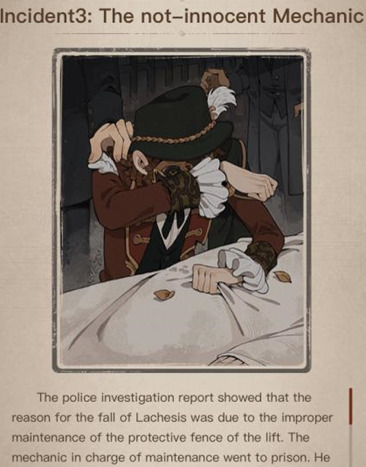

Speaking of Benny planning to betray Norton, I think it’s possible Benny may have been involved in the death of Norton’s parents. I already discussed how Benny parallels Scrooge who contributed to the death of Ronald’s father. Besides Scrooge and Golden Rose Theater, there’s also Teahouse Tales and Norton’s Sparrow skin. During Teahouse Tales, Lady Thirteen, Sparrow’s adopted mother, is assassinated by Flying Guillotine. Both Scrooge and Flying Guillotine were the coworkers of Norton’s parental figures and essentially betray this parental figure, causing Norton to be all alone afterwards.
Besides Scrooge and Flying Guillotine, there’s Marshall from Season 10 Essence 1. I already said Marshall kept Norton as Gold Digger from looking for gold, but Marshall in that essence also killed anyone that actually attempted to find the gold. The reason for this was because there was no real gold. It was just fool’s gold, but they wanted people to think there was gold around, as they had built a town and casino which is how they earned most of their money. If people discovered the gold was fake, they’d lose all the money they were earning from the miners that came to the town, attending the casino, or buying the dynamite from Western Baron.
Norton takes the list without bringing Benny with him. As I said before, I believe Benny wanted all the gold for himself and planned to betray Norton in the end (this could be backed up by Benny’s obviously not great personality based on the letter, which depicts Benny as foul-mouthed, emotional, obsessed, petulant, selfish, etc…). It’s possible Norton suspected Benny might betray him and thus why he didn’t bring Benny along. There’s also what I said earlier about the olive branch and how Norton didn’t like all of these people because of how they potentially treated him and their negative feelings of him (due to being “intimidated” by how hard he worked).
Finally, the last reason Norton couldn’t bring Benny along even if he wanted to comes from Benny’s age and current condition. Hospice is care that focuses on comfort and quality of life for people who are terminally ill or dying. Benny was old and didn’t have the strength or health to mine anything anymore. Norton knew it was more effort than it was worth to bring Benny along, especially as once they were at the mine Norton would still have to do all the work himself. Norton likely knew Benny was close to death. It’s even implied by how Norton’s 1st letter is called an “Unsent Letter” or “a letter that was not sent in time”. The reason it never got sent is because Benny died before he could send it.
Anyways, Norton sets out to each of the 13 mines Benny gave him in the hopes of finding gold.
As we know from Norton’s deduction 5, we know he had no luck at any of these 12 mines. There’s a chance Benny only gave him these 12 mines to hide which one actually might have gold in it.
Deduction 5: Patience
Next time…
Diary: Tomorrow, I will go to the last place recorded by the old man. If there’s still nothing, then I hope he...
After going to 12 different mines and finding nothing, Norton’s desperation is growing, so he directs his frustration at Benny. Norton is patient and persistent, but it’s taken him so long to go through each mine. He’s losing hope. Unfortunately, the last mine he has to check is mine number 13, and this number lives up to its unlucky reputation.
The 13th mine is Golden Cave. This mine is different, and not just because of the gold inside. It was struck by a meteorite (the “unidentified object”), resulting in the mine becoming unstable.
Deduction 6: Courage
The more dangers, the more opportunities.
A Geological Report: Part of the tunnel had been blocked by an unidentified object. One small mistake could cause the inner structure of the mine to collapse.
After an amount of time, Norton’s desperation grows. Despite the blockage and instability of the mine, Norton decides to try to use dynamite to be able to search deeper inside the mine. The dynamite was likely to remove the “blockage” preventing them from going deeper into the mine. But it’s illegal to steal dynamite, so he recruits several other miners to help him and accomplish this without being caught. Norton isn’t the only one who wants to find gold and get out of poverty, which is why he managed to get others to help him out.
Deduction 7: Alert
You need to be more cautious.
News: Due to the use of gunpowder and detonators, the era of simple rock drilling is coming to an end.
Deduction 8: Share
You need more helpers.
Mining Precautions: Theft of explosives is illegal and will be reported to the police once discovered.
Unfortunately, as is warned in deduction 6, the mine collapses as a result of the explosion from the dynamite. We know not all of the miners caught in the accident were killed, based on the miner from Hastur’s 2nd letter who states “the nightmare from the mine and the explosion which took my legs and eyes”, but it’s likely a number of the others did die.
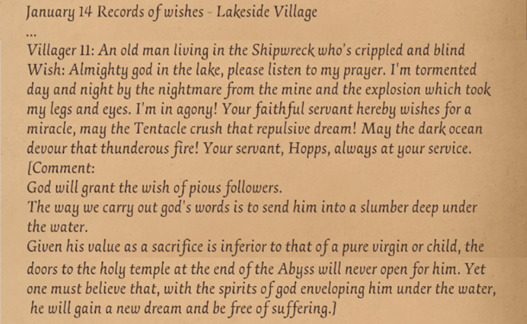
Deduction 9: Wisdom
Smart people know when to hold on and when to let go.
An Accident Report: An explosion collapsed a mine on the outskirts of the city. It’s suspected that the miners had mishandled the explosives, and the police expressed that there’s little chance for anyone to survive.
Norton was lucky enough to survive the accident, but the explosion left him severely burned and scarred. He was also left trapped in the mine for some time before he could be rescued. It was probably only for a couple days, if anything because I don’t think the police or other officials would care to keep looking for survivors after too much time. Fortunately, there commonly is water in mines, so he wouldn’t have died of thirst, and he wouldn’t have reached the point where starvation would’ve become an issue (aka, I don’t think he needed to resort to cannibalism. Even if he were that hungry, I think he was in a different section of the mine from the other miners that were trapped after the accident, since if he were with them, there’s a good chance he would’ve died with them. It makes sense considering mines in the latter half of the 19th century were required to have 2 shafts, and were also divided into different section. So even if he wanted to, he wouldn’t have been near any of the other miners to cannibalize).
Deduction 10: Luck
That’s only because the rest are just unlucky.
1-Page Case: Moderate 1burns to the face. Suspected to have been caused by direct exposure to excessive temperatures.
Regarding more specifics about Norton’s potential injuries, let me give a real life example of someone else who was in similar circumstances to Norton (from the link I gave earlier). After one accident led to an explosion and being trapped, the person was horribly burned over their whole body, while his coworkers died. This person, besides his burns, also had several broken limbs and internal injuries. He had to lay in bed for 14 weeks and couldn’t work for 7 more weeks after he got out of bed. He earned no money when he was hurt and had to have his expenses paid by his family to manage.
Going back to the accident, Norton is quite smart and should’ve been aware of the risks. Part of it was likely due to him having gotten used to the risks, as he’s had to deal with them all his life. But I wonder if the other part is if maybe he didn’t know about this report about the mine being unstable after being hit by a meteorite. The owner of this mine is Count Barriere, the same person who owns Moonlit River Park and contributed to/helped cause the Hullabaloo tragedy.
Moonlit River Park
Moonlit River Park was once a popular local attraction. Hosted by Count Barrier, the majestic city walls and roller coaster tracks across the Moon River were built in the Moon River area. The Moon River runs from south to north, passes through the track, flows in and out from under the city walls, which also creates a unique scene of this theme park, with the Moon River as the boundary line, and an approximately symmetrical pattern. In the early days of operation, this roller coaster track brought a steady stream of tourists to the Moon River. With the increase in income, Count Barrier has successively added haunted houses and merry-go-rounds, and signed a contract with the traveling circus called "Hullaballo", introducing malformed shows and circus performances. The bustling tourists made the Moon River Park famous, and the residents of the towns in the distance also came here.
Good revenues made Count Barrier decide to hold a grand event. Moon River Park will be open all night, closing the door. The closed park will allow people to temporarily be free from the uninteresting long night of curfew. The price is too high to stop the enthusiastic guests, and the tickets are sold out quickly. Laughter, fine wine, music, and tangy food aromas come as no surprise, this event will become a topic for the residents throughout the year. But no one expected that a crazy circus employee would turn the joyous carnival night into a nightmare. People cried and screamed, trying to escape the horrible figure wielding a chainsaw, but the locked gates and high walls cut off all the ways out. The only survivor was a young lady who jumped into the Moon River at the beginning of the chaos and escaped from the park under the wall following the current. People no longer talk about Moon River Park, it has become a secret that nearby residents cannot tell. It is said that even if these words are only spoken gently, a miserable cry will sound in the ear.
We know from Golden Cave’s backstory combined with the line for the map from in game and from the Little Girl’s comment about Golden Cave during the Time of Reunion event, that he apparently was desperately looking for something.
Despite that not a single piece of gold was ever found, Count Barriere still got what he wanted with this land.
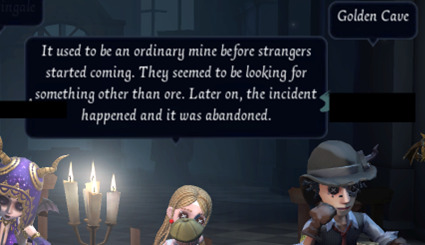
I’ve also already discussed how bad mine owners typically were back in these days, what with treating miners as slaves, willing to dismiss and replace their entire workforce if they complained or asked for a raise in wages, not caring about health and safety just so they could save money, and so on. Especially with how Barriere is connected to and willing to help cause a massacre, I don’t think he would’ve cared enough to warn his workers about the mine being unstable. Maybe some of the miners that worked there when the meteorite first struck might know, but it’s been some time since then, and Norton, who is rather new to this mine, would definitely not have been told, either by Benny or Barriere. There’s a chance the 13th mine was crossed of due to Benny being aware that mine was dangerous, but I still don’t think it was the only reason, not with how obsessed he was with finding gold.
In which case, if Norton didn’t know about the mine being unstable, that could have contributed to his willingness to risk using dynamite in the mine.
While Norton was trapped in the mine, he never did find the gold. I believe the other miners trapped in a different part of the mine separate from where Norton was were with the gold. This comes from how, when Golden Cave was released, near the gold is where the ghouls could be found. These ghouls were likely the very miners that died in the accident, and are probably the very reason no one can get close to the gold now.

To be more specific, these ghouls are most likely to be “wendigos”. These monsters from folklore are affiliated with cannibalism, as any human who cannibalized to survive were said to turn into a wendigo. These creatures have an endless craving for human flesh, and whenever they ate another person, they supposedly grew in proportion to the meals they ate so they could never be full. They were cursed to wander, eternally seeking to sate their hunger until nothing was left and they starved to death. Wendigos are also associated with murder, greed, and gluttony. Some have even said that people overpowered by their greed could turn into wendigos. Regarding descriptions of wendigos, the most common include glowing eyes, long yellow fangs, long tongues, claws, tall (10-15 feet sometimes), were thin and emaciated (as a result of constantly starving), skin stretched so tight you could see their bones, sunken eyes, and looked skeletal with ashen and decaying skin.
To back up this idea, there’s how the word “starving” actually appears on the map for Golden Cave. This relates to how I was just explaining wendigos are associated with “starvation”.
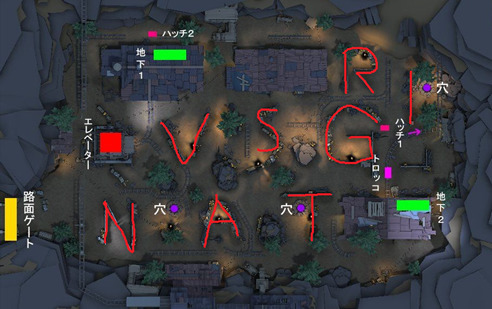
Norton on the other hand ended up where the meteorite was. While he was trapped, Norton took a chunk of the meteorite with him. This is what he used to make his magnets, which are called “meteorite magnets”, and the rod in his nose.
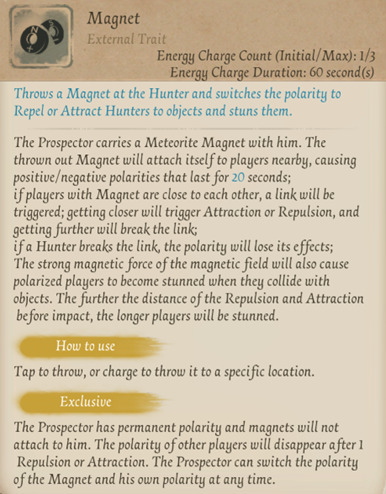
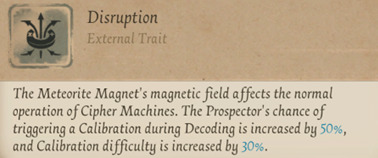
The Famitsu article even specifically states this is what happened. But that’s not the only thing it says. It also mentions that his magnets, the things made from the meteorite, “disturbed his brain” or that the accident “tangled him up inside”. This is important because it says right before this that “his personality became all the more extreme” after the accident, “at times gloomy and depressed, while at other times explosively hot tempered and avaricious”.
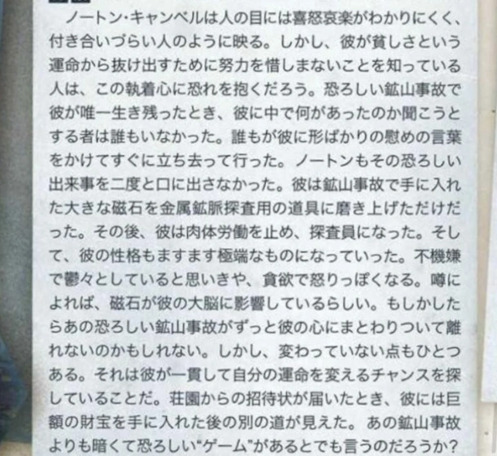
Famitsu Article (Prospector Profile)
Norton Campbell in the eyes of others was always someone hard to deal with, whose emotions were as changeable as the weather. But all knew that he worked tirelessly to break free of his impoverished fate, and this intimidated them. When he fortunately survived a terrible mining accident, nobody came to hear out his experiences during the time. All they did was give him a few token words of comfort, and then they gave him a wide, wide berth. Norton himself never once brought up the terrible experience again, only silently polishing the large chunk of magnetic ore he received in the accident into a tool for prospecting metals.
Eventually he gave up manual labor, and became a prospector. But his personality became all the more extreme, at times gloomy and depressed, while at times explosively hot tempered and avaricious. Rumor has it that the magnets disturbed his brain, or that that terrible mining incident tangled him up inside. But one thing never changed. He always sought out chances to change his fate. When the invitation to the Manor appeared before him, those incredible sums of wealth looked to him like his next stepping stone! Come on, how could a ‘game’ be any darker than that mining incident?
I think part of the reason Norton became “more extreme”, according to both the character relations page and the famitsu article, was because of the meteorite at Golden Cave.
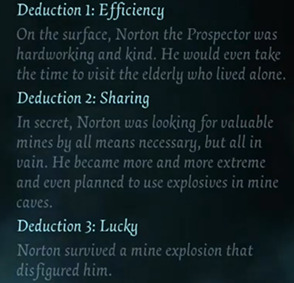
Famitsu Article
But his personality became all the more extreme, at times gloomy and depressed, while at times explosively hot tempered and avaricious.
The meteorite seems to have an effect similar to the one described in the Season 19 Essence 1 design notes. Specifically, it says something is influencing the participants at the manor and drawing out their inner “ugliness and desires”, until it arouses the “evil” hidden in them. Similar to this, there was a fern from the 1st anniversary package that was labeled with “Know Thyself”. Ferns are all throughout the backstory trailers and skins for Season 18 Essence 3 (Source of Evil) and Season 19 Essence 1 (Hollow), which is why I’m saying this fern and its label relates to this same info from the design notes. We also know that Barriere wanted something besides the gold from Golden Cave, and he did get it. It’s possible he was after the meteorite, which might be the thing influencing the people at the manor, based on how Golden Cave is on the same mountain that Oletus Manor is, the mountain Barriere is stated to own in Golden Cave’s backstory.
We know this is the same mountain Oletus Manor is on because, in Golden Cave’s backstory it says, after gold dust was found, Barriere “ordered the road to the mountain to be closed”. This matches up with the “pallets” Bane is stated to have found in his deduction 2 that “blocked the road” (on the mountain to Oletus Manor).
Bane’s Deduction 2: Remove Obstacles
Someone has blocked the road with pallets. What are they trying to do?
This is still a peaceful forest, despite these unsightly pallets. They'll get caught in the antlers.
So, if Barriere managed to get the meteorite, which is possible considering we know after the accident Norton was trapped with it, and if Norton was rescued that means the way to the meteorite was also clear. So if Barriere owned the mountain Oletus Manor was on, and he could’ve occupied the manor after the tragedy that killed the DeRoss couple before Baron DeRoss becomes owner, maybe the meteorite was moved there. It’s also possible that the meteorite simply being in Golden Cave, which isn’t far from the manor, that was still close enough to affect everyone in the manor without being moved.
In any case, the point I’m trying to make is the meteorite may have the very effect described in the Season 19 Essence 1 design notes, which draws out a person’s “inner ugliness and desires” and arouses the “evil” hidden in them. In which case, that would affect and enhance Norton’s desperation and “desire” to change his fate and find gold. As a result, that’s why he was more willing to do something risky like use dynamite.
After he’s rescued from the mine, it takes a long time for him to recover. Based on that 1 example, Norton may have broken several bones after the collapse which, combined with being burned over most of his body, it likely took him several months to fully recover (similar to the man from the example I gave). This would have cost him greatly, probably using up a lot of what savings he had. As he’s recovering, he attempts to talk to people about “his experiences”, but everyone just kept avoiding him. From the Famitsu article, it says they “All they did was give him a few token words of comfort, and then they gave him a wide, wide berth”. As a result, Norton becomes quiet and even more unsociable than he was before, and apparently “never once brought up the terrible experience again”.
Norton was traumatized by the mine accident, and as we see from his biography on the character relations page: “he changed his profession and became a geological surveyor to make a better living and to get away from the darkness of the mines”. The Famitsu article mentions something similar, about him becoming a prospector instead after the accident.
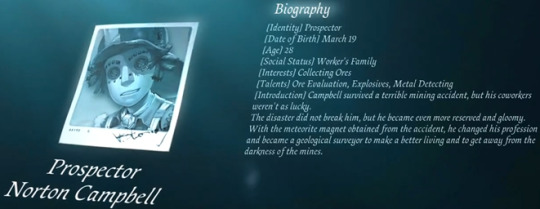
Famitsu Article
Eventually he gave up manual labor, and became a prospector.
His dislikes also prove this, as he is listed as having a dislike of “dark and enclosed environments”.
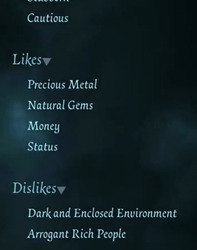
This means Norton acquired a fear of the dark (nyctophobia) and confined spaces (claustrophobia) after his experience of the mine accident and his time being trapped until he was rescued. Obviously, he doesn’t want to go down into the mines anymore, but he especially doesn’t want to go anywhere near Golden Cave. Part of his trauma also likely comes from knowing and seeing how he hurt and killed people. Besides that, I wonder if more of his trauma comes from encountering any ghouls in Golden Cave or even something to do with either the meteorite or the large eye down in Golden Cave.
Speaking of the eye, there’s 1 theory that the eye belongs to Gla’aki.
He is a “Great Old One” that came to earth with (imprisoned in) a meteorite from space. When the meteor landed, Gla’aki was freed. The depression where the meteorite fell became a lake, and Gla’aki lived at the bottom of the lake. He has countless metal spikes on his body (like a hedgehog) that he uses when he turns a human into one of his followers by piercing them with one of these spikes and injecting them with fluids that allow him control the person and their thoughts. Gradually, this person essentially turns into a living corpse or undead puppet (a process apparently called “The Green Decay”), and after a long enough time, if they are exposed to sunlight, they will turn to dust. Gla’aki’s followers can help this happen by holding down a person if they try to resist. New followers act almost just like a normal person (eating and drinking and working during the day with no problems), and they are independent and intelligent to some extent, but the older they get, the more zombie-like they become. Gla’aki is also apparently a telepathic creature, as he uses radio waves or a “magnetic force” generated by his brain to control a person.
Interesting coincidence, but the author of the story about Gla’aki was a man by the name of Ramsey Campbell.
The meteorite Gla’aki came from was said to have left a depression that became a lake. This can relate to Golden Cave as Golden Cave and Lakeside, which has a lake, are connected.
First, there’s the similar green lights (fireflies most likely) in both locations.


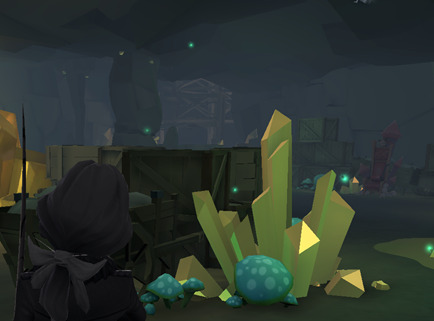
Then there’s how one of the exit gates in Lakeside leads to Golden Cave (it probably even connects with the exit gate on the bottom (3rd) level of Golden Cave).
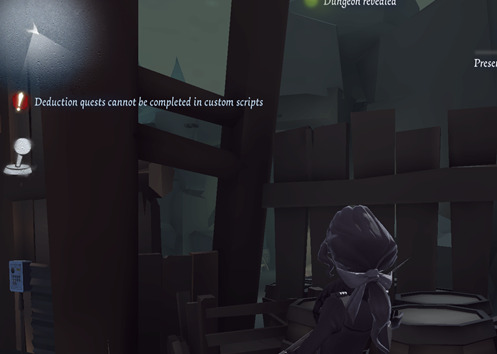
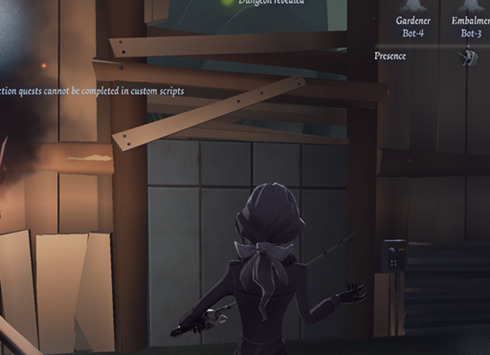
Also, there’s all the green in Lakeside, including in the sky, connects with all the green in Golden Cave, including the eyeball in the mine and the little green fire things. (All the green makes me think of Gla’aki’s “green decay”).

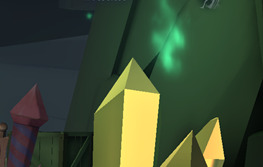

The fact that there’s a mine near Lakeside Village comes from Fiona’s 1st letter (with the “mountain” it mentions relating to how the Golden Cave is located in a mountain owned by Count Barriere, based on the background for Golden Cave).

I’ve already explained that this “narrow mountain path” is the one that leads to Oletus Manor, the one referenced in Bane’s deduction 2.
This mine is also what the disciples call their “sanctuary”, the one according to Fiona’s 1st letter that the remains of their offerings are thrown into for the “last part of the ceremony”. Yidhra’s 1st letter confirms the sanctuary is the mine.

Considering what I said earlier about the ghouls and them potentially being wendigos, I wonder if all the food thrown into Golden Cave is going to them (and thus what if the remains of their sacrifices and the last part of their ceremony could be for Gla’aki?).
Going back to Norton after the accident, despite everything, Norton hasn’t given up on “changing his fate” and getting out of poverty. Maybe part of the reason is because he didn’t want the deaths of the miners at Golden Cave to go to waste. He couldn’t give up yet.
Famitsu Article
But one thing never changed. He always sought out chances to change his fate. When the invitation to the Manor appeared before him, those incredible sums of wealth looked to him like his next stepping stone!
After the accident, Norton became a geological prospector, which is how he is attempting to earn money rather than returning to being a miner and having to go back down into any mines. A prospector is someone who searches for mineral deposits, while geophysics applies physics to investigate and define objects or materials in the earth’s subsurface without direct contact.
Specifically, with his magnets, Norton is performing magnetic prospection.
The magnetic field of the Earth magnetizes rocks to a variable degree which is determined by their magnetic susceptibility, intensity, and magnetizing force.
A magnetic survey is one of the exploration tools used for measuring localized changes in the Earth’s magnetic field, caused by sedimentary rocks or mineral ore bodies. The magnetic properties of mineral ore bodies and igneous rocks allow them to be easily identified and mapped, via magnetic surveys. This survey involves mapping changes in the magnetic field to determine the shape, size, and location of such ore bodies. In other words, with this method, you examine magnetic anomalies in the field to find various minerals.
Magnetometers is a tool used when performing magnetic surveys to measure the strength and direction of the magnetic field in the vicinity of the instrument. This method can be used, not just to find magnetic deposits, but also to map archaeological structures or find things like iron artifacts (which explains some things like Norton’s small furnace accessory).
To go back to what magnetic susceptibility is, it is a measure of the ability of a substance to be magnetized in the presence of an external magnetic field. In principle, magnetic susceptibility measurement is based on the amount and type of magnetic minerals within the rocks. In cases of positive magnetic susceptibility, the material within the rock can be ferromagnetic, antiferromagnetic, or paramagnetic. The material is said to be diamagnetic if the magnetic susceptibility is negative. Depending on what the magnetic susceptibility is, you can identify what kind of mineral is nearby.
Based on the Famitsu article, Norton’s magnets apparently serve to help him perform this method. With everything involved and required for this, Norton is definitely quite smart and potentially ahead of his time. It fits considering Norton is “full of curiosity” and loves learning. He may not have been able to get or afford much of an education, but obviously he’s gotten to where he is by himself, likely by reading and studying on his own. Not to mention, I think while this is definitely an alternate way for him to earn money, I also think he’s doing it because he enjoys it more than being a miner. From his birthday info, we know he likes “ore evaluation”, “ore excavation”, and “ore collecting”, while the character relations page states he likes “precious metals” and “natural gems”.
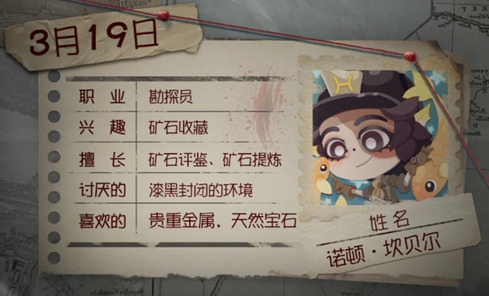
Norton Campbell
Birthday: March 19
Occupation: Prospector
Hobbi(es): Ore Collecting
Good at: Ore Appraisal, Ore Excavation
Dislike(s): Dark & Closed Environments
Like(s): Precious Metals, Natural Gems
Moving on, the next thing that happens is Norton’s 2nd birthday letter.

According to the character relations page’s summary, someone has asked Norton to assassinate some woman at Oletus Manor, a woman Norton considers to potentially be “arrogant”. Based on the Time of Reunion event, it’s possible this woman may be Melly (who is shown with him in the animation videos and during the in-game event). This relates to how 1 of Norton’s dislikes is “arrogant rich people” according to the character relations page. Arrogant rich people like the mine owners who served as his employers. The 2nd half of the letter talks a lot about why he dislikes the rich, but especially when he says “The poor find it difficult to lead a comfortable life, while all the rich need to do is wave their banknotes around”.
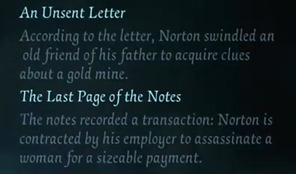
It’s because of this job that Norton heads to Oletus manor.
But there’s something else about this letter that I want to discuss. In this letter, Norton is talking to himself. This letter really gets into how Norton has 2 sides. We’ve already seen this brought up by the Famtisu article and how he switches between 2 extremes: gloomy and depressed, and then hot-tempered and avaricious. This same article talked about how Norton’s brain is getting screwed up by the meteorite and how it’s influencing him, and I’ve explained earlier that the meteorite’s influence is to draw out a person’s inner “ugliness and desires”, until it arouses the “evil” hidden in them. We’ve already heard from Benny that Norton had a “polarized façade” even before the mine accident, but that was only because he had to act friendly to get the info he needed. He’s always been gloomy based on what Benny says, and the reason for that is because of his current “fate” and life (of hardship and poverty). But it’s not until after the mine accident and meteorite that I think Norton actually developed 2 sides. The “gloomy” side should be Norton’s real personality, while the greedy side is the one being influenced by the meteorite like the Famitsu article says.
The fact the character relations page describes Norton as “thrifty” rather than greedy helps prove Norton’s greedy side is not the real Norton, and is the one influenced by the meteorite.
This greedy side is the one in the letter trying to convince Norton to take the job and kill the woman so he can get all the money being offered. The fact this side of Norton is working so hard to convince Norton shows that Norton doesn’t want to kill the woman.
Norton having 2 sides also fits with how I mentioned the name Campbell means “crooked mouth”. This matches with how in official art and in-game half of Norton’s facial expression is smiling, while the other isn’t (something closer to a frown or unhappy).
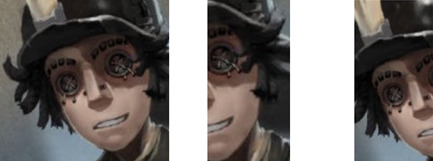
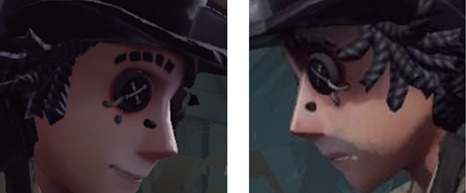
From all this, especially the letter, it’s possible that Norton (at least due to the meteorite’s influence) has either dissociative identity disorder (aka split personality disorder) or bipolar disorder. Bipolar disorder is a mental disorder that causes unusual shifts in mood, energy, activity levels, concentration, and a person’s ability to carry out day-to-day tasks. People with this have periods of unusually intense emotions, changes in sleep patterns, activity levels, and uncharacteristic behavior – often without recognizing their likely harmful or undesirable effects (mood episodes). Moods range from very “up”, elated, irritable, or energized behavior (known as manic episodes) to very “down”, sad, indifferent, or hopeless periods (known as depressive episodes).
Besides his personality, this letter also goes a bit into Norton’s life (at least from the perspective of the greedy side):
Over the last 20 years, I lived like a rat in the gutter. I spent days under the ground in the dark just so I could earn a minimal living. Scars from the blasts crawled all over my face like maggots. The constant scorn and ridicule... I endured it every time just so I'd get a chance to climb up the ladder.
It's ridiculous how much effort I put into this—anyway, I've finally managed to crawl out from the rat hole. I no longer have to pick and pull on the disgusting ash. Those who did nothing but laugh at me deserve to stay underground and be stepped on like maggots forever.
It confirms he earned very little and had a “minimal living”, or as the letter puts it “like a rat in the gutter”. Due to being a miner, he spent most of his days “under the ground in the dark”. He also mentions the “constant scorn and ridicule” that he had to “endure” every day just so he’d “get a chance to climb up the ladder”, which refers to Norton’s desire to change his fate and get out of poverty. This plus how he talks about “those who did nothing but laugh at me” is similar to the Famitsu article talking about people being “intimated” by how hard he worked. These things should go with the mention of having to offer an “olive branch” when he was acting friendly by caring for the old miners to get info about gold mines. This should prove that, the reason Norton had to offer an “olive branch” aka make peace or reconcile is because the very people he had to act friendly too, including these old miners, were the same ones Norton is saying gave him “constant scorn and ridicule” and “did nothing but laugh at me”. They laughed at how hard he worked because they didn’t understand why he did it. They laughed at his dream to get out of poverty, likely because they knew it would be essentially impossible for him to do. They thought he was just wasting his time and tiring himself out for nothing. This also explains why Norton didn’t think twice about leaving Benny behind. None of these people had ever treated him nicely or actually cared about him. They’d only ever treated him badly. So he decided not to care about them, to emotionally distance himself from all their insults so he wouldn’t be hurt by them.
Last thing about the letter is the very last part: “Such a simple ‘game’, such a generous employer. Clear an obstacle and you'll get a load of money. Isn't this much simpler than what you used to do?”. This parallels exactly what the Famitsu article said: “When the invitation to the Manor appeared before him, those incredible sums of wealth looked to him like his next stepping stone! Come on, how could a ‘game’ be any darker than that mining incident?”. What I find interesting is how both essentially state how they don’t think this “game” could be any harder than what he used to do or darker than the mine accident. He’s already always risking his life and has already been through a traumatizing experience. Any game, even a game that could include killing other people or potentially dying himself, doesn’t faze him at all. His life is already worse than anything this game could put him through.
I don’t think Norton at this point is even afraid of dying. This is proven by how Norton literally smiles when he gets downed in game. Part of it comes from his guilt from the mine accident. He made a huge mistake that cost some people their lives, and left him with lasting scars, both mental and physical. The other part comes from just how hard his life has been. That and the fact he’s had to face the risk of dying every day he works as a miner. This is nothing new for him.

#idv#identity v#identity v norton#idv norton#idv prospector#identity v prospector#norton campbell#idv norton campbell#identity v norton campbell#sirenjose analyses and theories
51 notes
·
View notes
Text
#Tomography Survey in India#Topographical Survey Company in India#Topographic Survey in India#Topographical Survey in India#DGPS Survey company in India#Land Survey Company in India#Detailed Project Report Preparation in India#Topographic Survey#Topographical Survey#Land Survey in India#DGPS Survey in India#DGPS Survey#DGPS#Land Survey#epitome
0 notes
Text
#Tomography Survey in India#Topographical Survey Company in India#Topographic Survey in India#Topographical Survey in India#DGPS Survey company in India#Land Survey Company in India#Detailed Project Report Preparation in India#Topographic Survey#Topographical Survey#Land Survey in India#DGPS Survey in India#DGPS Survey#DGPS#Land Survey#epitome
0 notes
Text
2
WARNINGS: MENTIONS OF MATURE CONTENT AND SUBSTANCE ABUSE
"CALI and I have always been friends. Her mum knew mine through modelling, then our dads realized they had a passion for shooting pheasants and watering plants." Felix relayed everything to his new friend Oliver. After the night at the Kings Arms, they had gotten close, extremely close. Oliver practically clung to his shadow. "People think she's this outgoing person, she is, but she's very kind, sometimes too much but she doesn't let it show."
"Is she scared of letting people in?" Oliver awkwardly shifted in his chair, surveying Felix's excitement whenever he talked about Calypso.
Felix shrugged, "Isn't everyone?"
"Not you," Felix chuckled at his retort. "But are you really friends? You act very close, India and Annabel shoot daggers at her whenever she walks into a room."
"They're possessive. But I don't really date."
"Wouldn't have guessed that. But you and Cali —" Felix's briefly hardening face made Oliver realize how true Farleigh's statement about her was. "Calypso," he corrected, "do you like her?"
"How could you not, look at her."
His tone was so enthusiastic, it was almost like she was in the room.
"I would but you'd have my eyes if I did for too long," Oliver joked, putting a warm smile on Felix's face.
After taking a long drag Felix replied, "She's not mine."
"But you want her to be?" Oliver subtly leaned in.
"Do I want to fuck her?" Felix laughed.
"Do you want to love her?" Oliver gingerly asked.
Felix already started, from when he noticed the scent of the shower gel she used to when she changed it to mango, he could've sworn that was his favoured flavour. The times her hair curls grew tighter with water and dripped with oil that her scalp absorbed. The giggle she let out at the show she was watching, Sex and the City, had a special place in her heart which Felix was forced to watch. All the instances she pushed up her glasses when they slid down her nose, pulled up her jeans that hung around her curves and flipped through pages of books she ranted to him about drew him closer, like Icarcus to the sea that caught him in the end.
Felix loved Calypso, possessively so.
___
Calypso danced like she and the music were one, the beat didn't move her, she controlled it, pulling at the drums, swaying to the symphonies and lip-syncing to the lyrics, putting on a show for all to see.
The strobe lights jumped around the room as she nodded her head, gossiping in the corner with Farleigh as he stared ahead, narrowing his eyes at how Felix catered to Oliver, shielding him from the cold eyes of their upperclassmen.
It was pathetic to him, seeing someone leach off his family.
"Come on Farls, dance with me," Calypso pulled him from the side, careful that his party hats didn't drop and twirled around him.
"Nice to see you in your fuck me pumps."
"They feel great," she teased, making him genuinely laugh as they pranced around, "It's never over, all my blood for the sweetness of her laughter."
Farleigh dropped his dismay as he danced with the girl, "it's never over," they belted out the nineties hit.
"She's the tear that hangs inside my soul forever!" Calypso's eyes scanned the room, landing on Felix when she finished the lyric.
He had been staring the whole time, beaming at her until his attention was stolen again. Oliver whispered in his ear and suddenly his eyes were on him and so she decided to stroll over, leaving Farleigh to the bodies who surrounded him.
Her braided hair was decorated with golden Jewelry, the first thing that Oliver caught when she appeared in front of them.
"What are you two nonses yapping about?"
"You," Felix shamelessly admitted, wearing a police hat.
He put zero thought into his costume, unlike Calypso, who was dressed like a cowgirl, donning boots that touched her knees, thrilly brown shorts that left little to the imagination, just like her shirt that exposed her midriff and chest. Her hat and whip were lost the moment she started drinking, not that she minded.
Felix's heated gaze drifted to her necklace that she sported every single day.
She squatted in front of them, leaning against Felix's stretched legs, fueling his lust, making him pluck off his hat and place it on his lap.
Calypso instantly smirked.
"You did something to your hair," Oliver snapped out of the trance and pointed out.
"Well, at least someone noticed," Calypso jabbed, playfully glaring up at Felix who pouted.
"I told you that this morning Cali," he said, sitting up slightly.
"But not this hour. Anyway, I'll soon be off to find MJ. Let's hope she isn't getting molested by your freaky friends."
Felix scrunched up his face, "She doesn't swing that way."
"She does and if she didn't it wouldn't stop them," she pointed out, expanding her hand on his leg, drawing a sigh from him.
"You told me she was shagging Colton," he said breathily.
"No, it was Cade, apparently they met last month when the twins dropped by. But Caspian the little git fell in love."
Oliver interrupted them, "Do we go to school with them?"
Their moments made his palms sweat, he often didn't know where to look, so he shared his focus between them.
Calypso snorted, "Fuck no. I mean that in the most loving way. They're my brothers. All complete dopes."
"Three brothers?" Oliver questioned, intrigued.
"Six," the friends corrected, stunning the boy. Calypso further added, "All beginning with C, just like me. Do you have any siblings?"
Oliver quickly replied, "No."
"Lucky you. Cherish that gift. Promise me," Calypso jutted her bottom lip.
Felix slyly smirked, shooting a glance at meek Oliver.
Calypso knew her impact on people, especially men, it was overwhelming, sickly to unexpected victims but alluring and interesting to the right ones.
"I promise." Oliver nodded quickly, as her gaze returned to Felix.
"Annabel clearly wants you," she stated, drawing him to clench his jaw. "She's in need of a quick shag."
Oliver, who was shocked at how the pair were acting as if they didn't need the other, was quick to pawn him off to her competitors. Or he came to learn she wasn't in the running. She had already won.
Felix sarcastically smiled and gently pushed her off, letting her take her place on the sofa next to Oliver.
The two now watched him save Annabel from Jake on the opposite couch, smacking her arse on the way out.
"Well, what the fuck, mate? I've been chirsping her for about an hour. I wanted at least a handjob," Jake exclaimed, groaning into his hands.
Harry scoffed, "I know. We all want a fucking handjob, mate. Get yourself a title and a massive fuck off castle."
Oliver didn't expect to see a smirk on Calypso's face, that met her sanguine eyes.
"Are you – you're not mad?"
He didn't understand and grew more uneasy when she faced him, crossing her legs, causing his stare to drop to them.
"Because I know he fucks them to the thought of me," she revealed, finding pleasure in the whole ordeal.
"And that's something you like?" he leaned closer, breathing in her mango scent, momentarily closing his big blue eyes, making her chuckle.
Calypso innocently told him, "Well... I do the same thing."
She laughed at his comically large gaze and quite frankly Oliver didn't know what to do.
"With them?" he squeaked.
"Why not? The pool for good shags around here is like a pond," Calypso gestured to their fellow students who she wasn't attracted to in the slightest. She then smacked a kiss to his cheek, staining the flushed skin as she rose from the couch, "Good night Oliver and make sure to tell Felix that for loyalty points, I know you need them."
She didn't spare him a glance when she strutted away, immediately being welcomed into Farleigh's circle who were dancing to Madonna's Vogue as Monika screamed her name.
"Cal!"
"Coming MJ!"
▃▃▃▃▃▃▃▃▃▃▃▃▃▃▃▃▃▃▃▃
a/n:
what do you think? keep commenting, i wanna know people's theories about the story.
https://pin.it/6CRef3fSp (vaguely how i imagine her costume) https://pin.it/3MHHGdJBm (how i imagine her hair for the night)
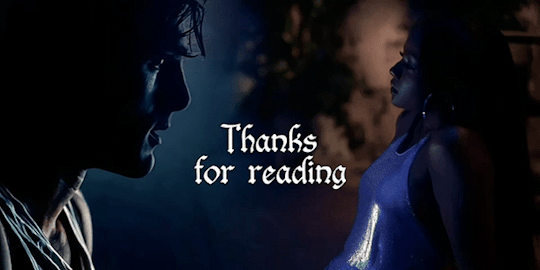
#rush saltburn wattpad#rush saltburn fanfic#rush wattpad#rush fanfic#felix and calypso#felix catton x calypso danforth#calypso danforth#calypso#felix and cali#felix catton x black!reader#felix catton x reader#felix catton#wattpad#fanfic#black reader#black girl#saltburn fanfiction
9 notes
·
View notes
Text
Chapter 211 Trivia
Try not to choke, dear Ryusui…
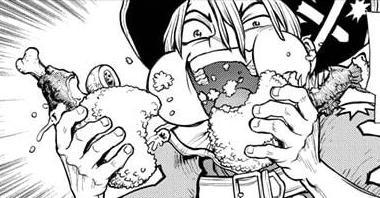
Going by the map and the several smaller islands, the KoS seems to have landed in South Kalimantan on the island of Borneo. The mountains in the background could be the Meratus mountains.
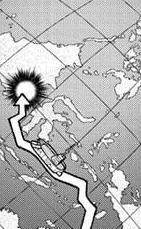

Indonesia is the world's second largest producer of rubber. The largest is Thailand which, geographically, isn't that far away, but it produces much less rice. This is probably why Indonesia was chosen for Rubber City instead.
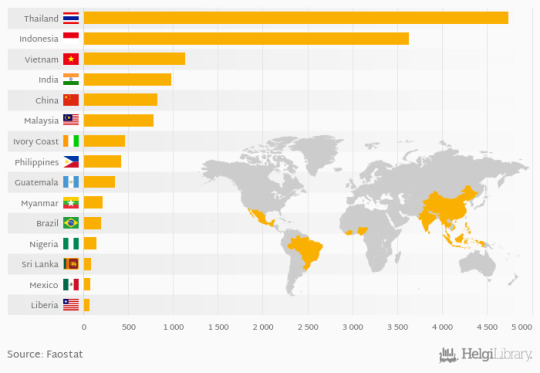
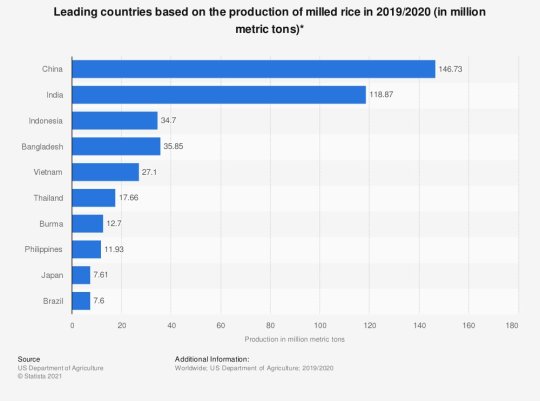
It's been 10 years since the KoS began the world tour:
-September 5741, Perseus completed
-January 5742, ground zero
~February, petrified for 7.5 years
-October 5750, arrive in India
-April 5751, arrive in Indonesia
-120 days for rice to grow, so it's around July/August.
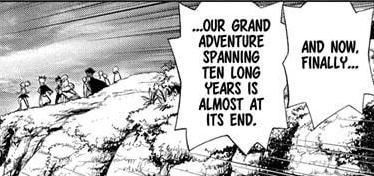
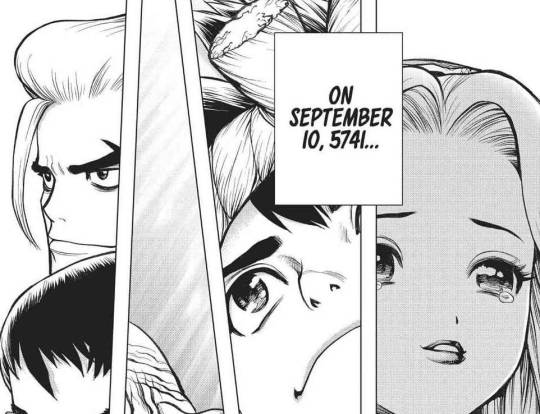
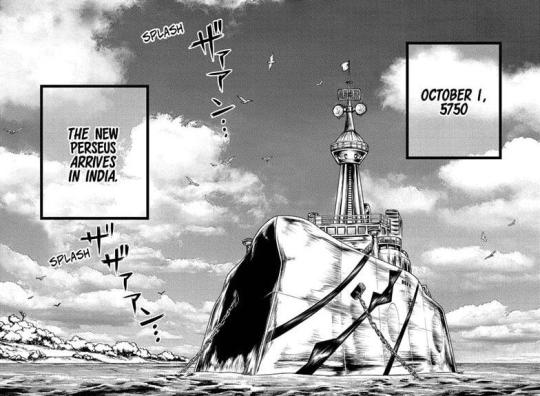
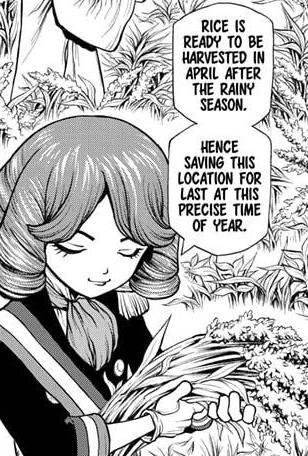
It's a shame we didn't see traditional Australian dishes such as Vegemite, fairy bread, kangaroo meat…
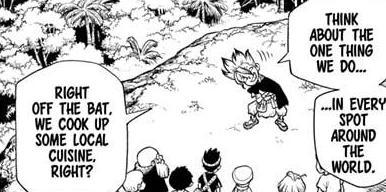


Rice grows from seed to harvest in ~120 days, so Indonesia can have 3 growing seasons. The most important one is the wet season from October to December, which is harvested in March & April. This is ~45% of total rice production for the year, which is the one the KoS harvested.
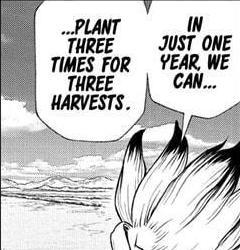
Character development.
(Gen finally tied up his cloak to stop it getting wet.)
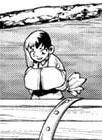
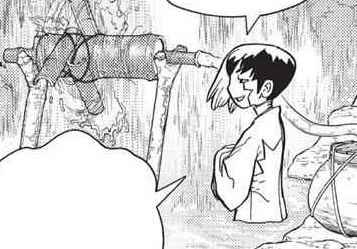
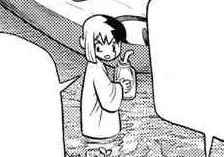
There's a lot of rice-based food in this image, so here's a few I've identified in case you need ideas for dinner.
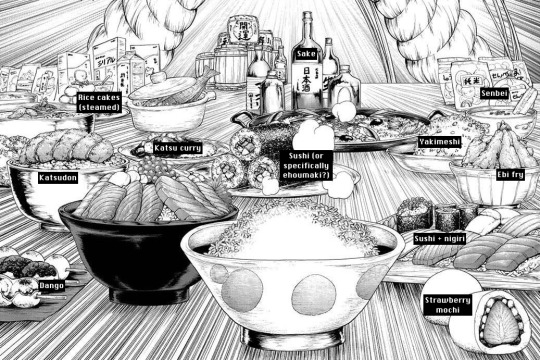
Chrome and Suika are surveying the land, presumably plotting (rice) paddies. Chrome is using a theodolite, which is used to measure angles on the horizon. Suika is probably measuring distance with the rope as extra data for their calculations.
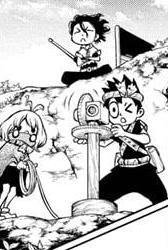

Sai's lesson seems to be proving Heron's formula using Pythagoras' theorem.
We can also see that Chrome's handwriting has improved since the last time he had to calculate the properties of triangles!

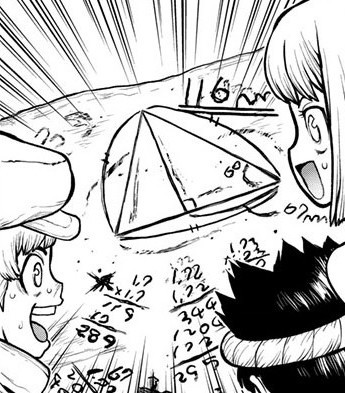
The device Kaseki built is an Archimedes' screw, which can be used to lift liquids or sand-like mediums upwards onto higher levels. In this case, it's being used to fill the rice paddies.

The mobile lab is truly one of the most valuable and hardworking members of the Kingdom of Science.

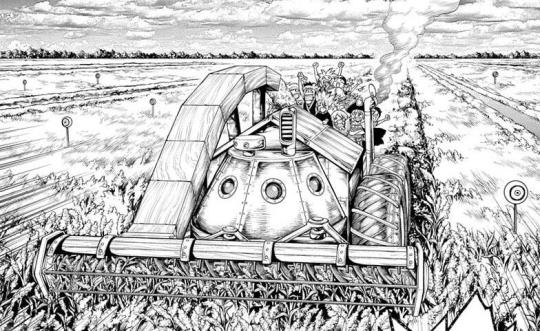
Nauru is one of the three great phosphorite islands in the Pacific Ocean, though thanks to too much mining in the last hundred years, the resource is almost completely depleted.
The prevalence of phosphorite is due to the albatross droppings, as Ukyo said.
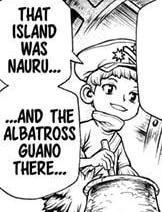
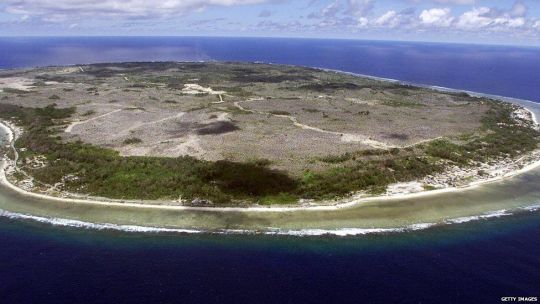
When Yo said they took a pit stop, this is likely the route they took.
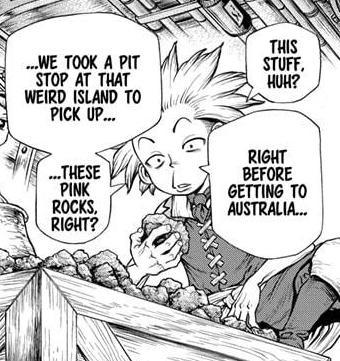
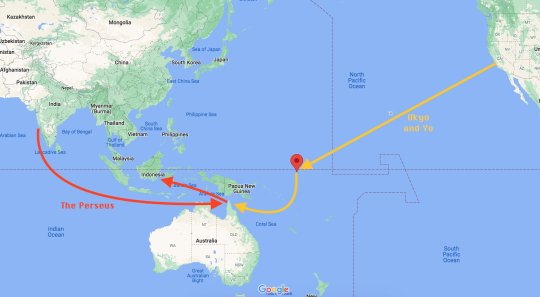
Fertilizer has 3 primary nutrients that help most plants to grow:
-Nitrogen, from the nitric acid
-Phosphorus, from the phosphorite
-Potassium, from the wood ash (this also has calcium carbonate, which, as we all know, has at least 4 uses.)

Rice has many different variants such as Japonica ("from Japan") and Indica ("from India"). Indica rice tends to be thinner and longer, and includes basmati and jasmine.
Amylopectin is a component of starch, and is what allows rice to stick to itself (necessary to make onigiri).
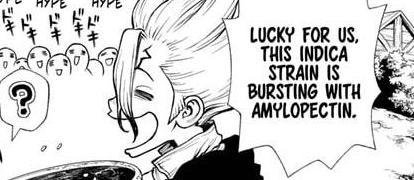
12 notes
·
View notes
Note
Hope this isn’t somehow an offensive question, but what’s the difference between Irish travelers and Romani people? I thought ‘travelers’ was another term for Romani, and that they were essentially the same thing? I’m not European so my knowledge of Roma people is all second hand
So, first of all, although I have some traveller ancestry (which is a whole separate complicated thing), I don't consider myself part of any of the groups covered by GRT and I didn't grow up within a traveller culture. I don't, unfortunately, know any Irish travellers on Tumblr, or I would direct this ask to them.
Irish travellers (also known as Mincéirí) are a distinct ethnic group who originate in Ireland. In UK, Irish and I believe EU law, Irish travellers have protections as an ethnic group.
Irish travellers have their own language and culture. The origin of Irish Traveller culture isn't entirely clear- possibly they are an ethnic group within Ireland who have never led a settled lifestyle OR they were group displaced from their land by English colonialism. However, they are genetically distinct from the "settled Irish" and are a separate ethnic group, legally and practically.
It's worth bearing in mind their language is a closed language and their culture, to an extent, is a closed culture.
Romani people are originally from the indian subcontinent, and travelled from India, through Asia, into Europe, and other parts of the world.
Both are nomadic groups, and they do have some cultural similarities, but in the UK at least, they regard themselves as separate racial groups (in fact, within the UK, there are multiple different groups of Romani as well, who regard themselves as somewhat separate) with distinct cultures- and I think it's really important to acknowledge that.
In the UK and Ireland they experience extremely high levels of prejudice, and they are sometimes grouped together under the heading of "GRT"- gypsy and romany travellers. This also includes other groups who live traveller lifestyles, but may not be genetically distinct from the settled population.
It's worth bearing in mind that some historical examples of prejudice, such as the holocaust specifically targeted Romani people only. However, in the UK, historically laws were made against "gypsies" and this therefore targeted both groups. Current issues, like the shortage of proper traveller sites, and the new laws against using stopping places and so on, and general prejudice target both groups. Generally, the same slurs are used to target both groups.
In the UK, historically, both groups have faced issues such as having their children removed and placed with settled families due to "homelessness".
Both groups are extremely discriminated against- sometimes surveys lump them in together, but a recent survey of ethnic minorities suggested that travellers (Irish and Romany together) experience the most racially motivated assaults of any ethnic minority in the UK. Which doesn't surprise me- I hear a lot of casual racism against travellers from people who'd never consider behaving that way towards any other ethnic group. P**** is the only racial slur I've ever actually heard used in my classrooms, for example, and I've heard it multiple times. It's also used as slang for stealing.
Surveys of educational outcomes distinguish between Romani and Irish travellers. Bear in mind it's difficult for these groups to access education if they live a traditional lifestyle. Romani children have the worst educational outcomes of any ethnic group in the UK, and Irish travellers are the second worst. The next lowest group is black-carribean, and their outcomes at GCSE are double that of Romani students. Irish travellers have outcomes which are less than 50% of the highest performing ethnic groups.
We know that Romani and Irish travellers are both disproportionately represented in the prison population in the UK. In Ireland, we know Irish travellers have a much lower life expectancy than other Irish groups.
Tl;DR- in the UK, travellers is a general term for anyone who travels, and this includes Irish travellers and Romani, who are both distinct ethnic/cultural groups.
42 notes
·
View notes
Text
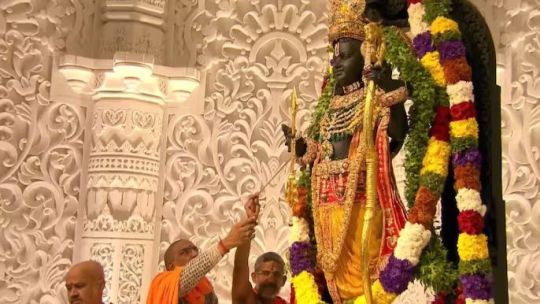
The 500-year wait is over! Lord Ram is home!!
Check out the full timeline:🔽🔽
- 1528: According to the history books, Babur's general Mir Baq was in charge of constructing the Babri masjid at the place where Lord Ram was born. The old temple was destroyed to construct the mosque.
- 1530-65: Unverified reports suggest communal violence over the Mandir-Masjid debate and Akbar, the then Mughal ruler, set up a common platform for worship.
- 1853-85: After almost 330 years, communal violence erupts again. The British Empire sets up partitions and Mahant Das’s plea to build a canopy above the platform is denied.
- 1949: The turning point comes when the idol of Lord Ram appears from inside the mosque. According to Muslims, the idol was placed inside the mosque by a radical Hindu outfit. As both parties file multiple lawsuits, the situation gets more complicated.
- 1950-61: Multiple lawsuits are filed and other parties join the fray with both sides claiming the land as theirs.
- 1983-1989: The Vishwa Hindu Parishad (VHP) starts a nationwide move to build a temple and legal tensions flare up. Muslims set up the Babri Masjid Committee and the former VP of the VHP files a suit on behalf of Lord Ram to get possession and the first stone for the temple is laid.
- 1990: BJP leader Lal Krishna Advani’s Rath Yatra from Somnath to Ayodhya saw thousands of volunteers march as they partially damaged the mosque in a scuffle that left scores dead.
- 1992: The bloodiest event in the Mandir-Masjid dispute as Hindu volunteers demolish the mosque and a bloody battle erupts throughout the nation. Over 2,000 were reported dead. A small tent is set up where the idol is placed for worship.
- 2002: PM Atal Bihari Vajpayee sets up an Ayodhya cell and the Allahabad HC judges begin determining ownership of the site.
- 2003: The Archaeological Survey of India begins surveying the area and a survey reveals the existence of a temple’s remains beneath the mosque. Muslims challenge the findings as tensions continue.
- 2010: The disputed land is split into 3 parts where one went to the Hindus, another to the Muslims, and the final one to the Nirmohi Akhara.
- 2011: All 3 parties approach the Supreme Court to challenge the Allahabad HC’s judgment and the SC issues a stay on the order.
- 2015-18: The SC removes all irrelevant parties from the lawsuit as the matter gets more sensitive during that time.
- 2019: After a failed mediation attempt, a five-judge bench announces a judgment in favor of the Hindus, and the Muslims are allotted 5 acres for the construction of another mosque.
- 2020: PM Narendra Modi lays the foundation stone for the construction alongside a commemorative plaque and a special postage stamp.
- 22nd January 2024: The temple is officially consecrated and Lord Ram, who has been in a tent since 1992, is unveiled for worship in a state-of-the-art temple.
Follow Jobaaj Stories (the Media arm of Jobaaj.com Group) for more.
7 notes
·
View notes